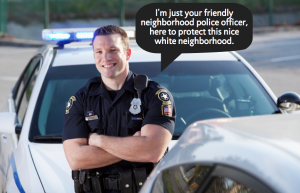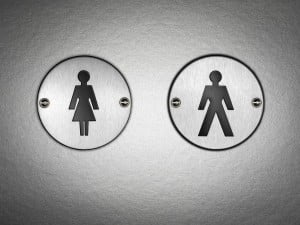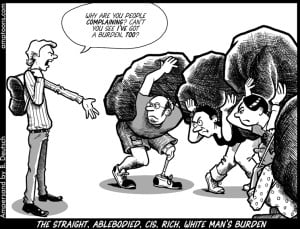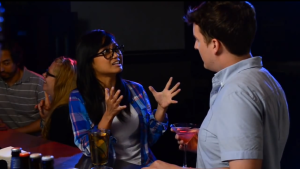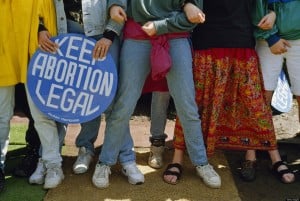
Person lying back on the bed smiling.
This article was originally published by Catherine Labiran. It has been lightly edited and republished here with the author’s permission.
Lately, I have been preoccupied with exploring and dismantling my old definition of self-care and building a new one that is tailored to my own experience.
This exploration was in part sparked by a dissatisfaction with the typical framing of self-care as being synonymous only with pampering. I also grew tired of conversations about self-care being solely linked to some form of meditation.
The title for this piece was inspired by imagining ways to care for myself after my incense runs or burns out. By incense, I mean both literal incense and incense as a metaphorical representation for all of the items that I previously turned to for self-care.
Along with these thoughts, I also came the realization of how companies that directly contribute to violence against Black lives were feeding on the grief that Black folk were experiencing and rebranding their products as remedies — a form of self-care.
Simultaneously, I acknowledged the discomfort that I felt when I realized that my idea of self-care was dependent on consumerism. I asked myself this simple, yet humongous question: what does internal liberation look like? Immediately I knew that my answer involved not having to search for things outside of myself.
I asked myself this simple, yet humongous question: what does internal liberation look like? Immediately I knew that my answer involved not having to search for things outside of myself.
I appreciate that my answer probably sounds like a romanticized, unattainable concept of independence, but it does the spirit good to dream. Having this dream, I was drawn to explore practical avenues of self-care that involved all of me, but little to no money.
I decided to start with touch. Yes, touching my own body.
I realized how much miseducation there is around touch – the misconception that touch only equates to sexual touch – the erroneous idea that our hands belong to everyone and everything but ourselves. Consequently, we become ignorant to our own bodies. Unfortunately, like many people, I arrived at my desire to be more knowledgeable on my body through health worries.
Through questions that I was unable to answer in the doctor’s office, I realized that it was impossible for me to recognize my sick body because I hadn’t acknowledged it healthy. So as I sat there in doctors office ignorant about the body that I live in, I made a promise to begin re-defining my idea of self-care with touch.
Saying it was easy — doing it was hard.
I noticed how apprehensive I was to begin this journey. I recognized that my skin had archived memories that I was afraid to trigger.
At the same time, I knew it was important for me to know the places on my body that remind me of hurt while also learning the places that make me smile and remind me of pleasure. I felt that this was important not only for my own personal knowledge but also to inform my physical interactions with others.
I developed a better understanding of my physicality through body mapping. Simply put, body mapping is a form of art and therapy where you draw an outline of yourself and fill it with words and images that come to mind when you reflect on that particular body part.
I was amazed that by thinking about particular body parts like my hands, feet, or stomach I became immersed in memories that evoked all of my senses. By engaging in this simple exercise I started to appreciate my body more by acknowledging how much it has carried.
I developed a deeper appreciation for the miracle of being — the way that parts of my body faithfully communicate with each other in order to allow me to wake up in the morning. I was thankful.
After body mapping, I moved on to body examinations. I worry a lot about my health, so this was incredibly hard for me – but I did it and now I can say that I “do” it.
I frequently give myself a breast examination in the morning. I aim to do this ritualistically not only for matters of health, but also to develop expertise on myself.
At first I found that statement weird – “develop expertise on myself” – am I not innately an expert on myself? When I thought about how much I change on a daily basis I realized that this being an expert thing will be a lifelong project.
I am also a firm believer in the healing power of hands. In many religious and spiritual texts you hear about someone or something stretching its hands, leading to healing. People have Reiki healing sessions and are transformed. People have massages and are renewed. I started believing that I could harness this same magic and that nothing was more deserving to receive this blessing than my own body. I have come to see the act of touch as prayerful.
People have Reiki healing sessions and are transformed. People have massages and are renewed.
I started believing that I, too, could harness this same magic; that nothing was more deserving to receive this blessing than my own body. I have come to see the act of touch as prayerful.
And, even though I regard this as a form of self-care, I see many ways that this could lead to collective and community-care.
It would be wonderful if more parents taught their children to be comfortable with their bodies. It would be wonderful if these dialogues could be sparked between friends. It would be glorious if our education systems and places of worship supported this kind of self-care in addition to other forms.
I think that’s important that I reiterate that this is a major deviation from my previous idea of self-care that was pretty much synonymous with pampering. But who knows — tomorrow may call for a spa day, or some good old incense and meditation. My joy comes from being open to this fluidity.
I still have a long way to go, but I am so glad that I have begun. I am so glad that I am finally giving myself back to me.
[do_widget id=’text-101′]
Catherine Labiran is a 23-year-old Nigerian writer who was born in New York, raised in London and is currently living in New Haven, Connecticut. Catherine is a graduate student at Yale and is also the Human Rights Advocacy coordinator at the US Human Rights Network.
Photograph taken by Kadir Gold.
Search our 3000+ articles!
Read our articles about:
Our online racial justice training
Used by hundreds of universities, non-profits, and businesses.
Click to learn more
Most Read Articles
- « Previous
- 1
- …
- 30
- 31
- 32








